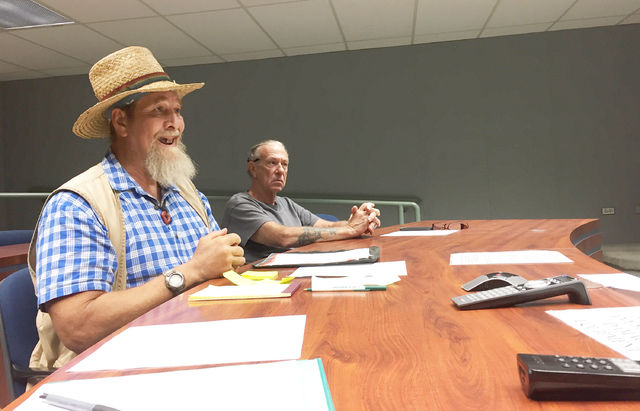LIHUE — Prior to using medical marijuana, Branch Harmony said doctors had him taking drugs for an illness and to counter-effect the effect of other drugs. “I’ve had medical challenges over the last decade that put me on a 40-week
LIHUE — Prior to using medical marijuana, Branch Harmony said doctors had him taking drugs for an illness and to counter-effect the effect of other drugs.
“I’ve had medical challenges over the last decade that put me on a 40-week treatment, where I do chemotherapy-like drugs every day and I’d spend 16-22 hours a day in a recliner,” the Lawai man said.
Nowadays, Harmony said he takes a couple of tokes of marijuana in the morning and is able to start his day.
“I’ll start writing and get active,” he said.
Harmony was one of a few Kauai patients who attended a public hearing on Friday in opposition to added language in the state’s administrative rules for medical use of marijuana.
The amendment would allow the disclosure of certain registration from the Department of Health medical marijuana registry program to authorized persons associated with dispensary system and the federal law enforcement officials for official law enforcement purposes.
The added stipulation of “federal law enforcement officials” is wrong, said Harmony.
“There’s a conflict between federal law and the state exemption,” he said. “What happens when that personal information about medical marijuana registry patients make it in banks, databases — where they’re considering you for a mortgage or a job? Under no circumstances, should the state share that information with the federal government without specific warrants.”
Janice Okubo, DOH spokeswoman, said to protect registered patients, the rules for disclosure of information must be clear and strictly limited.
“Disclosure of information for dispensaries will ensure legitimate access and proper control over the amounts dispensed to prevent diversion,” she said.
She said the registered information on patients could be used for federal authorities in order to know who legitimately uses marijuana as medicine.
Bruce Eutsler, a registered medical marijuana patient from Kapaa, also agreed that the federal government shouldn’t be involved in the proposed amendment.
“We should be allowed to make our own choice and keep our own records. They shouldn’t be able to use those records to track you — unless you’re breaking the law,” he said. “If they change their minds and say, ‘We just don’t really want the states to have their freedom anymore.’ They can do whatever they want.”
Under federal law, marijuana is illegal and considered a Schedule 1 drug. According to the Drug Enforcement Agency, Schedule 1 drugs have a high potential for abuse and does not have accepted medical treatment use. Schedule 1 drugs include heroin, LSD, ecstasy and peyote.
Hawaii legalized medical marijuana 16 years ago, and there are over 14,500 registered medical marijuana cardholders in the state as of Aug. 31.
As of June 30 there are about 1,700 patients on Kauai.
Eutsler, a registered medical marijuana patient for eight years, suffers from hepatitis C, anxiety and depression.
“I wouldn’t be here right now if it wasn’t for medical marijuana,” he said. “If I wake up at four in the morning, I might sit and read for a while, so I can gather my thoughts because they go crazy. I smoke a little bit and then I can do my work.”


